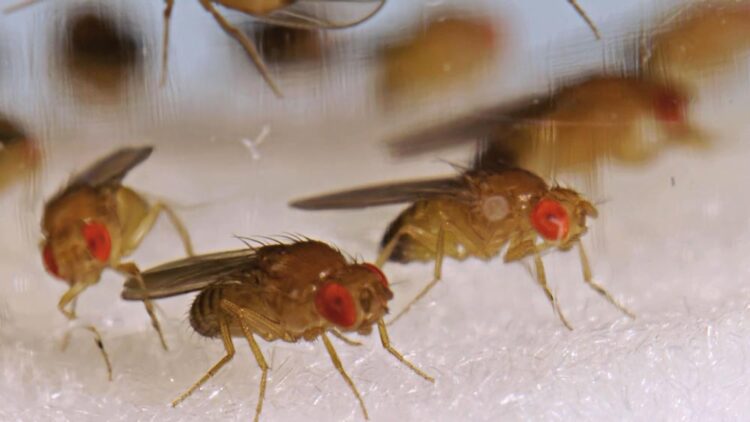Climate change favors insecticide resistance

Drosophila
Photo: Markus Riedl (Vetmeduni Vienna)
A research team from Vetmeduni Vienna proved for the first time that the fitness costs of insecticide resistance mutations of the ACE locus is significantly influenced by ambient temperature: at higher temperature the fitness costs of the resistance mutations are substantially lower than in cold environments. Such temperature-dependent fitness effects are important for insecticide resistance management strategies-in particular in the light of the current climate change.
Many insects, especially mosquitoes, are a widespread plague and therefore insecticides are widely used to control them. However, as nature is very innovative, insects quickly develop resistance to these toxins. However, resistance mutations are usually only beneficial in the presence of the insecticide and can even be harmful to insects in the absence of the toxin. This balance of costs and benefits of resistance mutations is an essential part of insecticide resistance management. A central problem, however, is that the costs of insecticide resistance have so far hardly been tested under ecologically relevant conditions.
ACE, a key gene for neural signaling, is a key target of many insecticides. Since temperature affects neuronal signaling and is a key environmental factor, a research team led by Anna Maria Langmüller and Christian Schlötterer from the Institute of Population Genetics at Vetmeduni Vienna analyzed the costs of insecticide resistance at different ambient temperatures.
Insecticide resistance benefits from higher temperatures
In the context of their study the researchers examined the evolution of a natural population of the fruit fly Drosophila simulans at hot and cold temperatures. This revealed a surprisingly strong influence of the ambient temperature. Christian Schlötterer explains: “In the cold temperature range the resistance mutations were strongly selected, but in a hot environment the fitness costs of resistance mutations were reduced by nearly 50%. We attribute this unexpected observation to the advantage of the reduced enzymatic activity of resistance mutations in hot environments”. The researchers thus demonstrated that the fitness cost of insecticide resistance genes is temperature dependent.
The scientists recommend that the duration of insecticide-free periods should be adjusted for different climatic regions to take these costs into account. “We assume that such environment-dependent fitness effects occur more frequently than previously assumed and represent a major challenge for the modeling of climate change,” says study author Anna Maria Langmüller.
Effective insecticide management must take environmental factors into account
Accurate estimates of fitness costs and a deep understanding of how these fitness costs are affected by environmental factors such as temperature are key to a successful insecticide management strategy. According to Langmüller, “Our study confirms that temperature is a key factor in the cost of resistance mutations. The difficulty of predicting fitness costs based on in vitro experiments clearly shows that resistance costs need to be studied in developing populations. Further work is needed to determine whether well designed experimental evolutionary experiments can predict the dynamics of resistance mutations in the wild.
Wissenschaftliche Ansprechpartner:
Christian Schlötterer
Institute of Population Genetics
University of Veterinary Medicine Vienna (Vetmeduni Vienna)
T +43 1 25077-4300
Christian.Schloetterer@vetmeduni.ac.at
Originalpublikation:
The article „Fitness effects for Ace insecticide resistance mutations are determined by ambient temperature“ by Anna Maria Langmüller, Viola Nolte, Ruwansha Galagedara, Rodolphe Poupardin, Marlies Dolezal and Christian Schlötterer was published in BMC Biology. https://bmcbiol.biomedcentral.com/articles/10.1186/s12915-020-00882-5
Weitere Informationen:
https://www.vetmeduni.ac.at/en/infoservice/press-releases/press-releases-2020/cl…
Media Contact
All latest news from the category: Ecology, The Environment and Conservation
This complex theme deals primarily with interactions between organisms and the environmental factors that impact them, but to a greater extent between individual inanimate environmental factors.
innovations-report offers informative reports and articles on topics such as climate protection, landscape conservation, ecological systems, wildlife and nature parks and ecosystem efficiency and balance.
Newest articles

Retinoblastoma: Eye-Catching Investigation into Retinal Tumor Cells
A research team from the Medical Faculty of the University of Duisburg-Essen and the University Hospital Essen has developed a new cell culture model that can be used to better…

A Job Well Done: How Hiroshima’s Groundwater Strategy Helped Manage Floods
Groundwater and multilevel cooperation in recovery efforts mitigated water crisis after flooding. Converting Disasters into Opportunities Society is often vulnerable to disasters, but how humans manage during and after can…

Shaping the Future: DNA Nanorobots That Can Modify Synthetic Cells
Scientists at the University of Stuttgart have succeeded in controlling the structure and function of biological membranes with the help of “DNA origami”. The system they developed may facilitate the…



